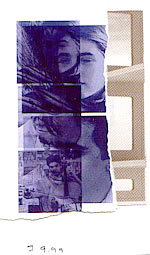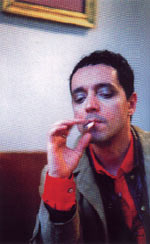The One You Really Love | |

| Prelude: Dream #290 Andy Warhol painting portraits of Stephin Merritt. Lester Bangs writing about it. Part 1 Throughout the last year of the last millennium (oh, that's 1999, if you are a pedant) I was keeping a daily sketchbook of collages. This sketchbook reminds me that on the 7th September of that year, The Magnetic Fields' 69 Love Songs collection was released. I documented this occasion with some overlaid prints of the covers, cut and glued over a gold grid structure, the source of which is now a mystery to me as much as to anyone else. What I do recall, however, with great clarity, is the unrivalled excitement with which I had previously placed my order for the 'limited edition' box set of this collection, and that this excitement was rising with each day as I awaited the transatlantic delivery. Of course the anticipation was terrific, and I'm pleased to report that on this occasion the Delta 5 were proved magnificently wrong; that those 69 songs made a magical accompaniment to an end of a century; that, as I said at the time, it laid out more proof that Stephin Merritt is God. It seems somewhat strange then, to be still writing about 69 Love Songs well over a year later. Perhaps it shouldn't; perhaps the magnitude of the opus demands that it rise above the insistent Popist concern for rapid, rabid turnover; perhaps it reflects on Merritt's initial impetus for the work to be seen as a 'review', as serious an examination, or perhaps exhumation, of musical lineage and the eternal obsessions with the demons and angels of 'love' as possible without straying over the line of acceptable behaviour, which is to say, into the waste lands of prog-rock pretension and overly academic navel-gazing and self-congratulation. Some say he fails of course. Some say that Merritt is the epitome of smug academia in Pop, as perfect a reflection of intellectual moroseness and emptiness as it is possible to find. Naturally such people are wrong. Such people are confusing The Magnetic Fields with the Divine Comedy, and maybe it's not their fault. I don't really know. What I do know is that it although it DOES feel strange to be still talking about the 69 Love Songs in January 2001, it still feels good to be doing so. It feels good that the record is gaining the plaudits of critics and 'consumers' alike, and if the temptation to ask 'where were you in September 1999 then' creeps up, well, that's only natural. That's only the nature of Pop, after all. |

|
If you're wondering what that whole Nature of Pop thing is about, I wrote about it all way back in the mists of time, and I'm not about to revisit the same ground again here. Or maybe I am. I have no idea. Repetition is an element of Pop importance, so maybe it's okay to repeat the same ideas. Someone else can decide on that one. And actually I will touch on the last time I wrote at length about the Nature of Pop, because those words and thoughts in the past were written about another Pop Obsession of mine, Belle & Sebastian, and you know, once upon a time they were the brightest stars in the firmament of my heart and it's useful to draw parallels because... because... because. Because. Anyway. Do you remember that Pop is Not Democratic? I do hope so. This is what, to me, made Belle & Sebastian end up as dull as the dullest ditch water. No, really. How many times have you listened to Fold Your Hands ...? And now, how many times all the way through? If you're anything like me, the answer is in single figures for the former, and the fingers of one hand for the latter. That's a hand with four fingers amputated. There was never ever any argument about Stuart Murdoch's lyrical and melodic touch of gold; he could write songs to break your heart, and songs to mend the rips again with kisses of the sweetest, most uplifting sensuality. Surround this sensibility with a raggedy band of strange musicians, and you had a genuinely peculiar Pop group that could, on their day, touch higher than the highest stars in the midnight skies. For this we allowed them their 'faults'. Goddammit, we even celebrated those 'faults' and said they were part of the mythic make up necessary for magic. And we were right, of course. Where it all went wrong though, for me at the very least (and I strongly suspect not JUST for me) was in the refusal of Murdoch to play the 'frontman'. Instead of saying that Belle & Sebastian were HIS band, he insisted that it was everyone's band. Democratic Pop... Ugh. Which isn't to say that there weren't good songs written by other members, just to say that there were very few of them, and that by the time of the last record, there was very little of Murdoch shining through the murk, which made for at best a mediocre record and a band that seemed to have lost its sparkle. |

| Magnetic Fields remind me of Belle & Sebastian, and not only because they are the bearers of the torch that bears the flame of obsessional Pop perfection at the moment. If truth be told they have been carrying the torch for quite a while, and even if I think back to when I was singing the praises of B&S from every possible (and some impossible) street corner, I was probably listening to more Magnetic Fields than anything else. 'With Whom To Dance' certainly made me weep more that 'The State That I Am In' for the longest of times, for what it's worth. No, the reason that Magnetic Fields remind me of Belle & Sebastian is for the very fact that they seem to be succeeding where the motley band of Glaswegians failed, and that is in understanding implicitly that rule about Pop not being democratic. Because although it would be myopic and just plain DUMB to ignore the importance of a whole cast of others in making Magnetic Fields the magical concoction they most assuredly are, it is also true to say that if it weren't for the plain and simple beauty of Stephin Merritt's songs, the whole argument would be a lot more shaky. Merritt's personality drives the Magnetic Fields in a way that Stuart Murdoch was either unwilling or unable to do with Belle & Sebastian. There seems to be no question of anyone else having a say in these Magnetic Fields' songs: these are Merritt songs, and if the band blend their own personalities into their emergence then that's all well and good, but, you know, in the end it's Stephin that matters. Kind of. It's totally unfair to say that of course, which in part is why I said it. It's more of that nature of Pop: give the world a personality to project onto; give the media a quotable artist with a strong identity, and if that identity is of a somewhat truculent soul with a set of magnificently structured points of view on the art form they are involved with, then so much the better. Stephin Merritt is all of this and more of course. |

| It's not just Stephin that matters. There's a point during the Saturday evening closing show of the Magnetic Fields' triumphant 69 Love Songs performances at London's Lyric Theatre (look, I'm taking it for granted that you know the premise of these shows - all 69 songs performed over two nights. Two full performances... four nights. There. I told you the premise anyway) where I have tears in my eyes. It's during 'Papa Was A Rodeo', and I'm close to crying partly because I wish people would stop laughing so much - out loud as well; it seems so undignified and so terribly gauche and insecure. 'Look at me! I'm clever because I get the joke!' Except most of the time they just laugh at the most inopportune of moments, when the humour is tragedy and really you ought to break down and cry - which I want to do because I'm in the midst of the most perfect sound, in the mists of my own heart breaking under the strains of projected desolation, and you know, I'm looking at this stage and seeing these people who are making these myths for my future, and knowing that each and every one of them is so full of beauty and breathtaking magic and, oh, what's that over-used word? Talent. I'm looking and hearing and falling and flailing inside and I wonder... I wonder... I really do wonder. I wonder what the point is. What am I going to say? How can I do this justice? Why don't I just stop? Why don't we all just STOP? What is the point? Here is, well, perfection for a split second, and what more time is there for perfection to be immortalised than the split second that lasts a lifetime and beyond? Here is perfection and in the light of this I am mute, numb, dumb, dumber than ever before. I wonder what I'm doing at all. I wonder why I should go on creating anything at all. It's never going to be good enough. And it's not good enough. |

| Interval. Maybe it's something in the air. Standing in front of Peter Blake's self-portrait (the one with the badges and the Elvis magazine in his hand) I'm struck with the same thoughts of questioning wonder. There's something so other-worldly about this painting that strikes me dumb, like the Magnetic Fields will do with their music later the same day. It's the same with many paintings, but more so with this one; the familiarity of reproductions that breeds, if not contempt, certainly a comfortable (mis)understanding about things; a contended appreciation that simply explodes into a billion sparkling shards when confronted with the very material essence of the REAL event. In this Peter Blake painting it is in the simple revelation that this has been painted so astoundingly exquisitely. It takes the breath away. And like looking at Hogarth with new-opened eyes, I realise all over again that the appreciation of life is indeed all in the detail... |

| Part 2 I remember the McCarthy song 'Frans Hals' with it's chiming steely melancholic call of 'it's not much to do... it's all I can do' and it makes me feel better. I think that although what I might produce is inevitably pale in comparison to the Art produced by those Magnetic Fields', it's still important that I continue. If only in the hope that someone MAY feel that this music is illuminated, brought to light; that I build perhaps some strange and rickety bridge. Sometimes I think in fact, that this is why I teach, but that's another irrelevant Tangent entirely. And so a part of my determination to carry on regardless is to give you this lowdown on why it's not just Stephin Merritt that matters. It goes something like this: Claudia Gonson can do no wrong. Claudia Gonson is your best friend's older sister, the one who used to smuggle the beer into the party and who laughed a lot at things you never understood. She is so remarkably up-beat, so naturally a performer, so perfect a foil for Stephin it's almost unfair. When the pair duet on 'Wi' Nae Wee Bairn Ye'lle Me Beget' and then on 'Yeah! Oh, Yeah!' you know you've seen a chemistry that is as mythic as, well, pick a dueting couple you are in love with and add to your list. I heard a voice say that she could have a career as a stand-up comedienne, which is true, but would be such a waste of her so many talents. Claudia Gonson can do no wrong, Claudia Gonson sings like an angel. To hear 'Acoustic Guitar' is to hear Julie London. LD Beghtol can do no wrong. LD Beghtol sings like an angel. LD is the leading light in what Stephin calls the 'acoustic Goth band' Flare, who last year released the remarkable 'Circa' EP. When LD steps up to the microphone to sing 'My Sentimental Melody', I swear that hearts stop throughout the entire theatre. It sounds that special. The word is that in the '80s LD paraded in pirate costumes, which says a lot about the very special personality he projects, not just when singing, but even just sitting between songs on the electric blue sofa that graces the back of the stage: the man was made for the theatre. And did I mention he sings like an angel? LD Beghtol can do no wrong. |

| Shirley Simms can do no wrong. Shirley Simms sings like an angel (do you get the idea here yet?). She manages to inject the most astounding amount of soul into a voice and yet avoids sounding stereotypically 'soulful', which is no mean feat. Her voice seems to come from nowhere and carries you off to everywhere. She once sang in a band called Lazy Susan with Claudia who were, says Stephin, 'much better than the Indigo Girls', which is amusing because I overheard an audience member say to their partner on the Saturday 'they remind me of the Indigo Girls'. I laughed. Inside of course. Dudley Klute can do no wrong. Dudley Klute sings like an angel. A Warhol angel with clipped wings and an unhealthy cigarette habit, sure, but that's an angel nonetheless. On 'Blue You' he sounds like Nick Cave or Tom Waits on their best days, looking for all the world like a nervous Sal Mineo, clutching the microphone as if it's a lifeline. Which it might well be. Dudley Klute can do no wrong. Dudley Klute sings like an angel. Naturally the singers get the most attention, but it's wrong to take anything away from the monumental contributions made by cellist Sam Devol, and guitarist/banjo player John Woo. Both sit impassively throughout the shows, turning in beautiful performances. Devol makes me remember the first time I saw Blueboy, in an odd Reading community center, with just guitar, cello and of course beautiful voices, and it makes me pleased that someone else recognises the value of the cello in Pop. Woo meanwhile delivers passages that put me in mind of truncated Tom Verlaine and Maurice Deebank moments, which is to say moments of divine wonder. |

| Then there's Daniel Handler. And guess what? Daniel Handler can do no wrong. Handler here plays accordion, dishes out the brandy, collects the scores at the end of the performances, and delivers the all-important hand-claps in 'Ferdinand De Saussure'. Like LD, he is made for the stage, carrying himself with an assured wit. He looks terrific, a little (post) Modernist Fitzgerald dandy in his suit and shiny shoes. In his other lives of course he has written two of the best books of the past few years in his debut The Basic Eight and Watch Your Mouth . He is also well known as the, ah, 'spokesman' for the very wonderful Lemony Snicket, whose continuing series of tales which document the torrid lives of the Baudelaire Orphans have graced the New York Times' top 20 bestsellers list of children's books for the past year. Quite why they have no UK publisher is beyond me, but then again it took a year for 69 Love Songs to get a UK release, so you know... it's following a pattern I guess. There is only one thing that I look forward to in 2001 more than the latest Snicket missive, and that's new Merritt songs gracing my stereo. Daniel Handler writes like an angel. Daniel Handler can do no wrong. Which leaves us with Stephin. The centre around whom everyone else revolves, the enigma who sounds, as has been said so oft before, like the meeting of Johnny Cash, Hank Marvin and Ian Curtis hovering over the musical theory section in a New York library. Stephin Merritt, naturally, sings like another of those chain-smoking angels. Stephin Merritt, naturally, can do no wrong. Which brings me back to where I started; where anyone with an (un)healthy Pop obsession ought to be starting, finishing, coming back to again to start all over again: and that is the simple understanding that without hopeless romantic worship, Pop is an empty vessel. The knowledge that Stephin Merritt is, for the time being at least and which is as close to forever as you'll ever be in need of, God. © Alistair Fitchett 2001 |